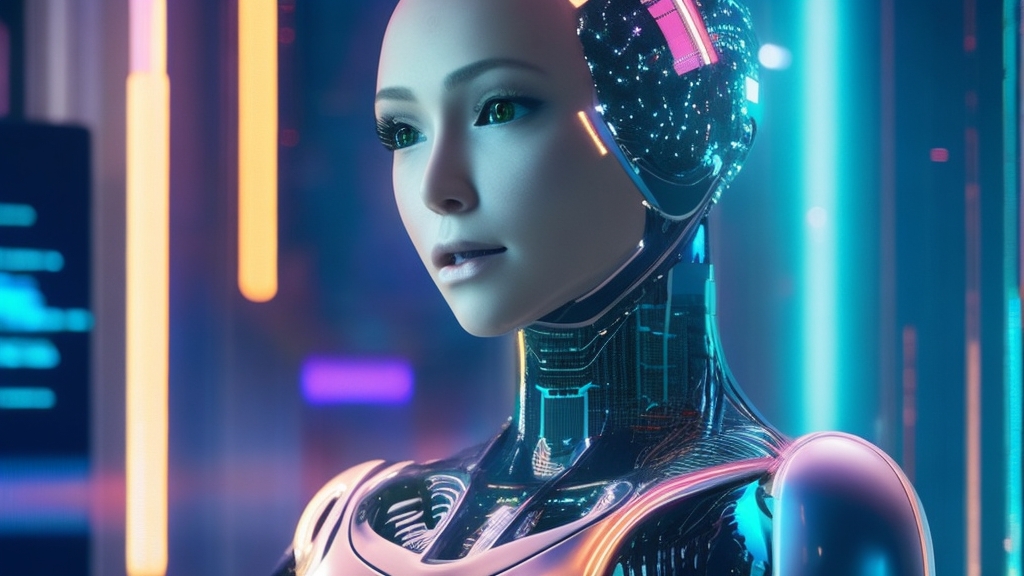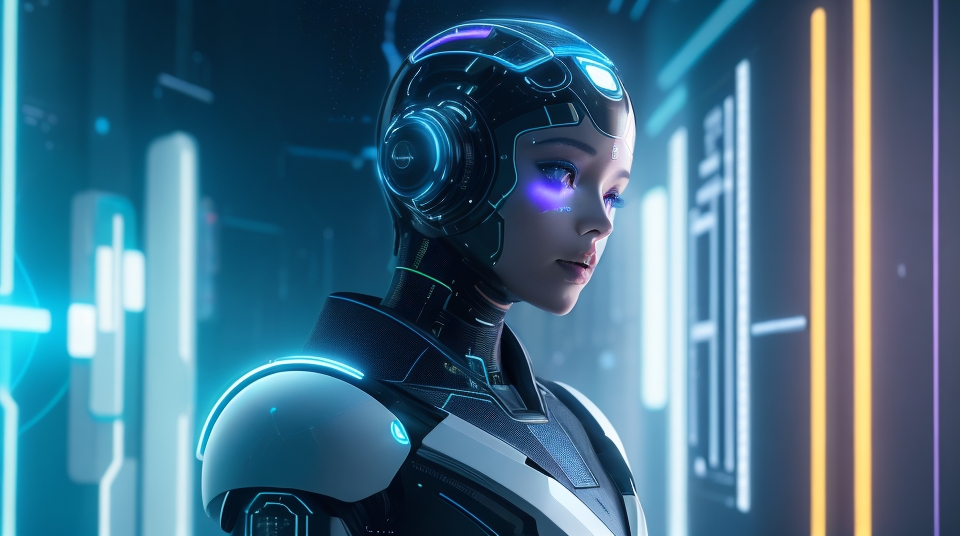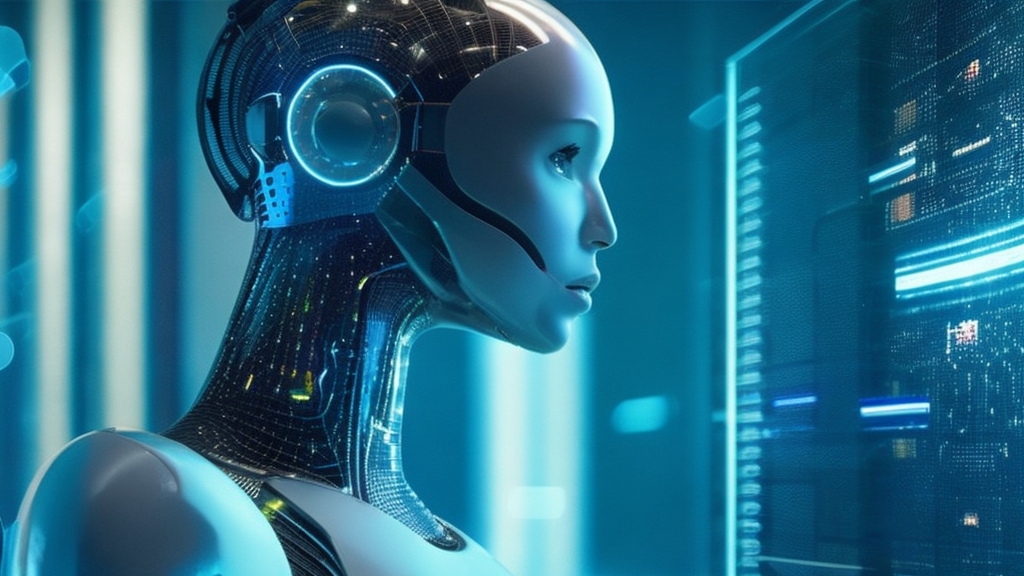AI for Content Adaptability: Revolutionizing the Content Creation Landscape
AI, or Artificial Intelligence, has become a buzzword in recent years, transforming various industries, and content creation is no exception. The fusion of technology and human intelligence has led to significant advancements in the way content is generated, consumed, and adapted to meet the needs of the digital era. In this article, we will explore the role of AI in content creation, focusing on its evolution, impact on the digital content landscape, and its relationship with SEO.
Understanding AI and Its Role in Content Creation
AI refers to the simulation of human intelligence in machines that are programmed to think and learn like humans. Its application in content creation involves the use of algorithms and deep learning techniques to automate various aspects of the process, enabling faster and more efficient content production.
The Evolution of AI in Content Writing
The use of AI in content creation is not a recent phenomenon. It has evolved over the years, starting with basic language processing tools that facilitated grammar and spell-checking. As technology progressed, AI tools became more sophisticated, enabling automated content generation and customization.
The Impact of AI on the Digital Content Landscape
The advent of AI has revolutionized the digital content landscape. It has empowered content creators to generate a higher volume of content, cater to diverse audiences, and deliver personalized experiences. AI-powered tools analyze vast amounts of data, allowing publishers to understand their audience better, optimize their content strategies, and stay ahead in the highly competitive online market.
The Relationship between AI and SEO
SEO, or Search Engine Optimization, plays a crucial role in ensuring content visibility on the internet. AI has greatly influenced SEO practices by providing content creators with valuable insights into user behavior, search patterns, and algorithm updates. The integration of AI and SEO enables content to adapt to ever-changing search engine algorithms, ensuring high rankings and increased organic traffic.
The Benefits of AI in Content Writing
While AI in content creation presents its fair share of challenges, it also offers several benefits that have transformed the way content is generated, improved quality control standards, increased content volume, and facilitated personalized experiences.
Enhancing Efficiency in Content Generation
AI has significantly enhanced the speed and efficiency of content generation. With AI-powered tools, content creators can automate time-consuming tasks such as research, data analysis, and proofreading. This allows writers to focus on the creative aspects of content creation, saving valuable time and enabling them to produce high-quality content at a much faster rate.
Improving Quality Control in Content Creation
One of the key advantages of AI in content creation is its ability to ensure consistent quality across all content produced. AI algorithms can analyze grammar, syntax, and readability, identifying and correcting errors more accurately than traditional proofreading methods. This helps maintain a high standard of content and eliminates the risk of publishing subpar work.
Increasing Content Volume with AI
AI-driven content generators are capable of producing vast quantities of content in a short span of time. This is particularly beneficial for content-dependent industries such as e-commerce, where an extensive product catalog necessitates an equally extensive amount of descriptive content. With AI, businesses can scale up their content generation efforts without compromising on quality.
Personalization and Customization of Content with AI
AI enables content personalization on a large scale, catering to the specific interests and preferences of individual users. By analyzing user data, AI algorithms can deliver personalized recommendations, experiences, and content, enhancing customer engagement and loyalty. This level of customization creates better user experiences, leading to increased conversions and brand loyalty.
The Challenges and Drawbacks of AI in Content Writing
While the benefits of AI in content writing are evident, it is imperative to acknowledge the challenges and potential drawbacks associated with its usage. These include concerns surrounding creativity, the overreliance on algorithms, potential job losses, and issues of authenticity and plagiarism.
The Question of Creativity in AI-Generated Content
One of the primary concerns associated with AI-generated content is the question of creativity. Can a machine truly replicate the creative thought processes and ingenuity of a human writer? While AI can mimic certain aspects of creativity, such as generating catchy headlines or structuring articles according to predefined templates, the ability to produce truly original, thought-provoking content remains a human quality.
The Overreliance on Algorithms in AI Content Creation
AI-powered content generators heavily rely on algorithms to produce content. While algorithms are efficient at processing data and identifying trends, they lack the intuitive understanding and context that human writers possess. This can lead to a lack of nuance, creativity, and the inability to delve deep into complex subject matters, resulting in the production of generic and shallow content.
The Potential Job Loss for Content Writers
The rise of AI in content creation has raised concerns about potential job losses among content writers. As AI continues to improve and produce increasingly sophisticated content, there is a fear that human writers may become obsolete. However, it is crucial to recognize that while AI can automate certain aspects of content generation, it cannot replace the unique perspectives, critical thinking, and creativity that humans bring to the table.
The Issue of Authenticity and Plagiarism in AI-Generated Content
AI-generated content also raises concerns related to authenticity and plagiarism. As AI algorithms analyze vast amounts of existing content to generate new material, there is a risk of inadvertently reproducing or paraphrasing existing works. This can lead to issues of intellectual property infringement, making it essential for content creators to exercise caution and implement mechanisms to detect and prevent plagiarism.

The Role of AI in Education and Its Implications
AI's influence extends beyond content creation in industries such as education. The use of AI in the educational sector has the potential to revolutionize the way students learn, complete assignments, and interact with educational resources.
The Use of AI in Student Assignments
AI-powered tools are increasingly being used in educational institutions to assist students with assignments. These tools provide automated feedback on grammar, sentence structure, and content organization. They also aid in plagiarism detection, ensuring academic integrity and promoting originality in student work.
The Risks and Benefits of AI in Education
The integration of AI in education presents both risks and benefits. On the one hand, AI can enhance personalized learning and provide tailored educational experiences for students. On the other hand, concerns arise regarding the potential bias in algorithmic decision-making, the dependency on technology, and the devaluation of human interaction in the learning process. Striking a balance between leveraging AI for educational advancement and preserving the human touch is crucial.
The Issue of Plagiarism in AI-Generated Schoolwork
AI-generated content poses a significant challenge in the context of student assignments. With AI's ability to generate coherent and well-structured content, there is a risk that students may rely too heavily on AI tools, leading to unintended plagiarism. Institutions must establish guidelines and policies to promote responsible AI usage and educate students about the importance of ethical research practices.
The Need for Guidelines and Policies in Using AI in Education
The use of AI in education necessitates the establishment of clear guidelines and policies to ensure responsible usage and safeguard against potential risks. These guidelines should address issues such as data privacy, algorithmic bias, ethical considerations, and the role of human educators in the learning process. Collaboration between educational institutions, policymakers, and AI developers is crucial to strike a balance between harnessing the benefits of AI and preserving the integrity of education.
Regulating AI in Content Creation
The rapid advancement of AI in content creation necessitates effective regulation to address ethical concerns, privacy issues, and ensure responsible usage.
The Current State of AI Regulation
As of now, AI regulation is still in its early stages. Governments and regulatory bodies worldwide are grappling with the complexities of formulating policies that strike a balance between innovation and protecting societal interests. Countries such as the European Union have taken preliminary steps by introducing regulations, such as the General Data Protection Regulation (GDPR), to safeguard individuals' data privacy rights.
The Challenges in Regulating a Rapidly Advancing Industry
Regulating AI in content creation presents numerous challenges due to the rapidly evolving nature of the industry. The technological advancements often outpace the formulation of regulations, making it challenging for lawmakers to keep up. Additionally, the global nature of the internet further complicates regulation efforts, as content can be created and consumed across borders, requiring international cooperation.
The Role of Government in AI Regulation
Governments play a crucial role in AI regulation. They must establish legal frameworks that promote responsible AI usage, ensure data privacy and protection, address potential biases, and protect against misuse. However, striking the right balance is essential to avoid stifling innovation and hindering industry growth.
The Future of AI Regulation and Its Impact on Content Creation
As AI continues to advance and its role in content creation expands, regulations surrounding its usage will continue to evolve. Stricter guidelines may be established to protect against unethical practices, algorithmic biases, and ensure transparency in AI-generated content. These regulations will shape the future of content creation, enabling responsible AI usage while preserving the creativity and integrity of human-driven content.
In conclusion, AI's integration into content creation brings forth a myriad of possibilities and challenges. While AI enhances efficiency, improves quality control standards, increases content volume, and facilitates personalized experiences, concerns about creativity, overreliance on algorithms, job losses, authenticity, and plagiarism must be addressed. Additionally, in sectors such as education, the role of AI necessitates guidelines and policies to ensure responsible usage. Effective regulation of AI in content creation is vital to address ethical concerns, privacy issues, and strike a balance between innovation and societal interests. AI for content adaptability propels us into a new era of content creation, where human ingenuity collaborates with machine intelligence to deliver engaging and tailored experiences in a rapidly evolving digital landscape.

AI Tools and Technologies in Content Creation
Overview of AI Tools for Content Writing
AI tools have revolutionized the content writing process, offering a range of capabilities that improve productivity and content quality. These tools encompass various functions, such as automated research, content ideation, grammar and spell-checking, and even translation services. They provide writers with valuable assistance, minimizing tedious tasks and allowing them to focus on crafting engaging content.
Role of GPT-3 in Content Generation
GPT-3 (Generative Pre-trained Transformer 3) has emerged as a groundbreaking AI tool for content generation. Powered by deep learning techniques, GPT-3 can produce coherent and contextually relevant content. It has the ability to mimic human-like writing styles and generate articles, blog posts, and even poetry. Its impressive language model and vast dataset have propelled the capabilities of AI-generated content to new heights.
AI and Social Media Content Creation
Social media platforms have become essential communication channels. AI has played a crucial role in optimizing social media content creation. AI tools analyze user behavior, engagement patterns, and trending topics to generate social media posts that resonate with the target audience. These tools make content creation for social media more efficient, effective, and adaptable to the ever-changing landscape of social media trends.
AI in Competitive Analysis and Content Optimization
AI-powered tools are instrumental in competitive analysis and content optimization strategies. AI algorithms can analyze competitors’ content, identify keywords, and trends that resonate with the target audience. This insight enables content creators to refine their content strategies, create more engaging and relevant content, and gain a competitive edge in the digital marketplace.
AI and the Future of Content Marketing
Predicting Content Trends with AI
AI has the ability to analyze vast amounts of data and identify patterns, allowing content creators to predict future content trends. By understanding what topics, formats, and styles are resonating with the audience, Content creators can stay ahead of the curve and deliver content that is more likely to attract and engage their target audience.
AI in Content Personalization and User Experience
Personalization is key in content marketing, as it helps cater to individual preferences and creates a more engaging user experience. AI-powered recommendation systems use algorithms to analyze user data, such as browsing history and preferences, to deliver personalized content recommendations. This personalization enhances user experience, increases engagement, and ultimately drives conversion rates.
The Role of AI in Content Strategy
AI plays a crucial role in shaping content strategies. It provides valuable insights into audience behavior, preferences, and content performance, enabling content creators to optimize their strategies and allocate resources more effectively. AI-powered analytics tools can identify content gaps, recommend content optimization strategies, and track performance metrics, allowing content creators to refine their approach and achieve better results.
AI and the Evolution of Content Marketing Roles
As AI continues to evolve, content marketing roles are also undergoing significant transformations. While AI can automate certain aspects of content creation, it does not replace the need for human creativity and critical thinking. Instead, AI enables content creators to focus on high-level tasks such as strategy development, creative ideation, and audience engagement. Content marketers must adapt to these changes by acquiring new skills, embracing AI as a tool, and leveraging its capabilities to drive successful content marketing campaigns.
##. Ethical Considerations in AI Content Creation
AI and the Question of Intellectual Property
The use of AI in content creation raises questions about intellectual property rights. As AI-generated content becomes more sophisticated, it is crucial to address issues of ownership and attribution. Determining whether AI-generated content should be protected by copyright or if there should be a separate framework to recognize AI as a creator is a topic of ongoing debate in the legal and intellectual property communities.
Ethical Guidelines for AI in Content Creation
With the rise of AI in content creation, ethical guidelines must be established to ensure responsible and ethical usage. These guidelines should address concerns such as transparency, accountability, and the disclosure of AI-generated content. Content creators and AI developers need to collaborate to establish ethical norms that encourage AI to be a force for good in content creation while mitigating potential risks.
AI, Content Creation, and User Privacy
AI-powered tools and algorithms rely on large amounts of data to function effectively. The collection and storage of user data raise concerns regarding privacy and data protection. Content creators must prioritize user consent, data anonymization, and secure data handling practices to protect user privacy in the era of AI content creation.
The Role of Transparency in AI Content Creation
Transparency is a key consideration when AI is involved in content creation. Users should be informed when AI algorithms are used in content generation, ensuring transparency and maintaining trust. Content creators should disclose the nature and extent of AI’s involvement in content creation, enabling users to make informed decisions about the content they consume.

AI in Content Adaptability Across Industries
AI in Educational Content Creation
AI has profound implications for educational content creation. Intelligent tutoring systems use AI algorithms to deliver personalized content to students, adapt to their learning pace, and provide tailored feedback. This adaptability enhances the learning experience, allowing students to grasp concepts more effectively and engage with the content in a more meaningful way.
The Role of AI in News and Journalism
AI has the potential to transform news and journalism by automating certain aspects of the content creation process. News organizations can use AI algorithms to collect, analyze, and summarize news stories, reducing the manual effort required for content creation. AI-powered tools can also fact-check information and help combat misinformation, improving the accuracy and reliability of news content.
AI in Entertainment and Media Content
AI is revolutionizing entertainment and media content creation. It enables the creation of personalized recommendations for movies, music, and other forms of media. AI algorithms analyze user preferences, behavior, and consumption patterns to offer tailored content suggestions, enhancing the user experience and driving engagement in the entertainment industry.
AI and Content Creation in the Marketing Industry
The marketing industry heavily relies on content creation to engage customers and drive sales. AI-powered tools can assist marketers in generating content that resonates with their target audience, enables data-driven decision-making, and automates repetitive tasks such as social media posting and ad copy creation. AI enhances content adaptability in the marketing industry, helping marketers deliver personalized and targeted content across various channels.
The Global Perspective on AI Regulation
International Approaches to AI Regulation
Different countries and regions have adopted varying approaches to regulate AI. For example, in the European Union, the GDPR has been implemented, emphasizing data protection and privacy. In contrast, the United States has taken a more flexible approach, focusing on self-regulation and industry collaboration. Understanding the different approaches is crucial in developing a comprehensive global framework for AI regulation.
AI Regulation: A Comparison Between the US and EU
A comparison between the US and EU AI regulations sheds light on the varying perspectives and priorities. While the US emphasizes innovation and agile development, the EU has a stronger focus on privacy rights and ethical considerations. This comparison highlights the challenges of harmonizing AI regulation on a global scale and the need for international cooperation to address the ethical and legal implications of AI in content creation.
The Impact of AI Regulation on Global Content Creation
AI regulation has a significant impact on content creation practices worldwide. Regulations influence how AI tools are developed, implemented, and utilized in content creation processes. By addressing concerns related to ethics, privacy, and accountability, AI regulation aims to ensure responsible content creation practices that uphold the integrity and rights of both content creators and consumers.
Future Trends in Global AI Regulation
As AI technology continues to advance, global AI regulation will need to adapt to keep pace. Future trends may include stricter regulations to protect user privacy, increased transparency requirements, and guidelines specific to different industries. International collaboration and ongoing dialogue between policymakers, content creators, and AI developers are essential for shaping the future of AI regulation and content creation practices.
In conclusion, AI for content adaptability is revolutionizing the content creation landscape by offering efficient tools, enhancing personalization, and providing valuable insights. However, ethical considerations, proper regulation, and striking a balance between AI and human creativity are crucial for responsible AI usage in content creation. Across industries such as education, news, entertainment, and marketing, AI is reshaping the way content is generated, consumed, and adapted to meet the evolving needs of the digital era. International collaboration and ongoing dialogue are vital to establish ethical guidelines, ensure privacy protection, and harmonize AI regulation on a global scale. With responsible AI usage, content creators can harness the full potential of AI to create engaging, adaptable, and tailored content that captivates audiences worldwide.

AI Tools and Technologies in Content Creation
AI Automation Agency Services
AI automation agency services are becoming increasingly popular in the content creation industry. These services leverage AI algorithms to automate various aspects of content creation, including research, writing, editing, and publishing. With the help of AI automation agencies, businesses and content creators can streamline their content creation processes, saving time and resources. These agencies use advanced AI algorithms to analyze data, generate content, and optimize content strategies for maximum engagement and impact.
Authority Websites
AI tools can be used to create high-quality content for authority websites. These websites are trusted sources of information that provide expertise and credibility in specific domains. AI algorithms can analyze vast amounts of data and generate well-researched and authoritative content on a range of topics. By utilizing AI, authority websites can produce a higher volume of valuable content, attract more traffic, and establish themselves as leaders in their respective fields.
Social Media Posts
AI plays an integral role in optimizing social media content creation. AI algorithms can analyze user behavior, engagement patterns, and trending topics to generate social media posts that resonate with the target audience. They can also suggest the optimal timings for posting, identify the most effective hashtags, and even generate catchy captions. These AI-powered social media content creation tools enable businesses and content creators to generate engaging and shareable content, driving higher levels of audience engagement and interaction.
Feature Images
AI can assist in the creation of visually appealing feature images for content. AI algorithms can analyze the content and suggest appropriate visual elements, such as relevant images, illustrations, or infographics, that complement the written material. AI can also automate the image editing process by adjusting colors, cropping images, or applying filters. By utilizing AI for feature image creation, content creators can enhance the visual appeal of their content, capture readers' attention, and improve overall user experience.
AI-Driven Apps
AI-driven apps are revolutionizing the content creation landscape. These apps use AI algorithms to understand user preferences, behavior, and consumption patterns to deliver personalized content recommendations. They provide users with content based on their interests, enabling them to discover new articles, videos, podcasts, or other forms of content that align with their preferences. These AI-driven apps enhance content adaptability by offering tailored content experiences to individual users, increasing engagement, and promoting content discovery.
Through the use of AI automation agency services, the creation of content for authority websites, optimization of social media posts, generation of visually appealing feature images, and development of AI-driven apps, content creators can leverage AI to streamline their processes, enhance the quality and relevance of their content, and deliver personalized experiences to their audience. AI tools and technologies have opened up new avenues for content creation, empowering businesses and content creators to adapt and thrive in the ever-evolving digital landscape.

Frequently Asked Questions
How can AI automation agency services benefit content creators?
AI automation agency services can benefit content creators by streamlining content creation processes, saving time and resources. These services leverage AI algorithms to automate tasks such as research, writing, editing, and publishing. By utilizing AI automation agency services, content creators can generate high-quality content at a faster rate, optimize content strategies for maximum engagement, and focus more on the creative aspects of content creation.
What are authority websites, and how does AI play a role in content creation for these websites?
Authority websites are trusted sources of information that provide expertise and credibility in specific domains. AI plays a role in content creation for authority websites by analyzing vast amounts of data and generating well-researched and authoritative content. AI algorithms can gather information, analyze trends, and present comprehensive insights in a format suitable for an authority website. By leveraging AI, authority websites can produce valuable and high-quality content that establishes them as leaders in their respective fields.
How can AI tools optimize social media content creation?
AI tools optimize social media content creation by analyzing user behavior, engagement patterns, and trending topics. These tools can generate social media posts that resonate with the target audience by suggesting optimal timings for posting, identifying effective hashtags, and even generating catchy captions. AI-powered social media content creation tools enable businesses and content creators to generate engaging and shareable content, driving higher levels of audience engagement and interaction.
In what ways can AI assist in the creation of feature images for content?
AI can assist in the creation of feature images for content by analyzing the content and suggesting appropriate visual elements. AI algorithms can recommend relevant images, illustrations, or infographics that complement the written material. Additionally, AI can automate the image editing process by adjusting colors, cropping images, or applying filters. By utilizing AI for feature image creation, content creators can enhance the visual appeal of their content, capture readers’ attention, and improve overall user experience.
How do AI-driven apps enhance content adaptability?
AI-driven apps enhance content adaptability by understanding user preferences, behavior, and consumption patterns. These apps deliver personalized content recommendations based on individual interests, enabling users to discover new articles, videos, podcasts, or other forms of content that align with their preferences. By offering tailored content experiences, AI-driven apps increase user engagement, promote content discovery, and enhance the overall content adaptability for individual users.


